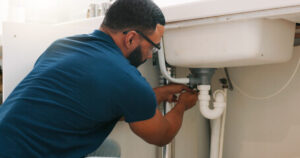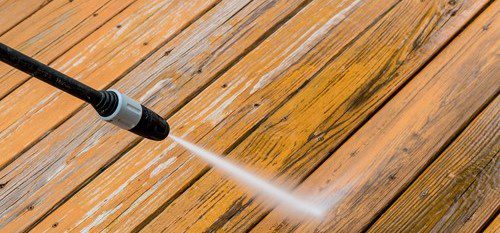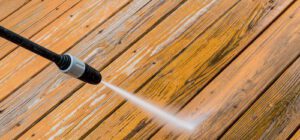Plumber Linden NJ involves fixing issues with pipes, fixtures, and other parts of your home’s water system. Some of these issues may have at-home solutions, but others need the expertise of a professional plumber.
Some common plumbing problems include clogged drains, leaky pipes, low water pressure, and poor water quality. Each of these can lead to further damage and expensive repairs if left untreated.

Clogged drains are a huge pain in the butt and can lead to serious water damage if left unchecked. While most people automatically reach for a bottle of chemical drain cleaner or call a plumber to get the job done, many simple DIY solutions can save you some money and hassle.
Start by looking down the drain to see if there there’s a visible blockage. If there is, use a wire coat hanger bent into a hook and work it down the drain to scoop out any hair or gunk. If the clog is shallow, this may be enough to clear it up. If not, try plunging the drain. A good plunger can usually dislodge even the most stubborn clogs. You can purchase one at any home improvement or hardware store for less than $10.
Another option is to pour boiling water down the drain. It’sIt’s a great way to loosen up and remove any stuck-on debris, including food waste from your kitchen sink. If your clog is still not resolved, try a natural, eco-friendly drain cleaner like Bio-Clean. This product is made with an all-natural enzyme that introduces good bacteria into the pipes and eats away at the buildup. It also works as a preventative maintenance product, so you can keep your drains flowing smoothly.
For more stubborn clogs, use a plumbing snake. Plug in the snake and feed a few feet of cable down the drain pipe. Turn the handle and crank it to break up and dislodge the clog. Once the clog is gone, run hot water down the drain for a few minutes to flush out the system.
If you have a leaky pipe, it is important to act quickly. A leaking pipe can cause water damage, which can be expensive to fix. It can also lead to mold growth, which is a health hazard. You should first shut off the water supply to the affected area. Most home plumbing systems feature a shut-off valve that can be turned clockwise to stop water flow. Next, clear the area around the leaky pipe and dry it thoroughly. You should also use an adjustable wrench to tighten any nearby joints. Finally, use a special type of pipe tape or epoxy putty to create a strong seal over the leaky section of pipe.
Pipe repair sleeve kits include both a rubber gasket and a clamp that work together to tightly seal a damaged portion of pipe. They are available at most hardware stores and are easy to install. However, make sure you purchase a sleeve that is the same size as the existing pipe to ensure a tight fit.
Slip couplings are another option for repairing leaking pipes. These watertight connections are similar to hose clamps, but they are designed for plumbing pipes. When purchasing one, be sure that it is the right size for your plumbing pipe and made of a material suitable for your system, such as copper, PVC, or ABS.
If you are unable to find the source of a leaky pipe, it is possible that it is in a hard-to-reach place, such as under a sink or in a wall. In these cases, you may need to hire a professional plumber for more in-depth plumbing repairs. However, a leaky pipe is still an emergency and should be repaired as soon as possible to prevent further damage to your home.
Often, low water pressure results from problems in the pipes. If the pipes are clogged or rusted, the water is unable to move freely and will have less power behind it as it moves. If a homeowner suspects that this is the case, they should shut off all of their water-consuming appliances and read their water meter. A dramatic change in the reading within a short amount of time can indicate that there is a leak somewhere in the home’s plumbing system.
A plumber will assess the piping to determine if the leak can be cleaned or if the pipe will need to be replaced. If it’s corroded, the plumber may use acid to clean out the pipe and remove any buildup. If the pipe is beyond repair and needs to be replaced, a plumber can install a new set of pipes.
If the plumbing system in the house has been changed or there have been recent additions, a plumber may need to install larger branch lines that can support the fixtures and water-consuming appliances that are now running in the home. A plumber will work with the homeowner to ensure that the branch lines are sized properly and that they are able to handle the flow of water from the pipes.
If all of the homes in a neighborhood experience low water pressure at the same time, it could be a problem with the local city water supply. It’s possible that a break in the main line has occurred, and if this is the case, it will take the municipality some time to resolve the issue. In the meantime, residents can ask their neighbors if they are experiencing the same issue to get more information on the situation.
One of the most common problems that homeowners encounter is leaking pipes. Whether it’sit’s water escaping from the back of your sink or dripping from an appliance’sappliance’s supply line hookup, leaky pipes are not only a major inconvenience but can also lead to costly water bills, damage to your home’shome’s structure and other issues.
Pipes can leak due to wear and tear, rust or damage from tree roots. Rust is especially problematic because it can eat through pipes and cause them to weaken or break. If you notice rust discoloration on your pipes or hear a loud banging sound when you turn on hot water, it’sit’s important to have a plumber assess the situation right away.
The most common type of leaking pipe is at the joint, where two pipes connect together. These areas tend to be more exposed to high water pressure and temperatures and can corrode over time. A simple repair with plumber’splumber’s tape or a self-fusing silicone pipe patch is often enough to fix this type of leak.
Leaking water behind walls and in crawl spaces is a more serious problem that can cause major structural damage to your home and make it unlivable. This is often due to old and outdated plumbing or excessive water pressure in your home. It’s a good idea to have your entire plumbing system checked and re-piped if needed once a decade.
Many plumbing repairs are easy for a professional plumber to diagnose and fix, but clogged drains and multiple leaks may require more extensive work. A professional plumber will be able to tell you exactly what needs to be done and can give you advice on how to prevent these problems in the future.
When pipes corrode or crack, they may leak chemicals and other harmful substances into the home’s water supply. These contaminants can cause health problems and reduce the quality of the water. Plumbing repairs are essential to preventing water contamination. Regular inspections and maintenance can help keep your plumbing system in good condition. Also, using pipes made from non-corrosive materials, installing water filters and softeners, and insulating water lines can prevent temperature fluctuations and reduce the risk of corrosion and clogs.
Water quality is affected by many factors, including water temperature, pH levels, and the presence of dissolved solids. However, the most significant factor in determining water quality is pollution. Pesticides, fertilizer, animal waste, and other human activities can pollute our water sources. These pollutants can be carried by rain to our homes, where they enter the plumbing systems and cause issues such as bad-tasting water, odors, or orange-colored rust.
Poor water quality is not only a nuisance for homeowners; it’s also detrimental to the environment. Water is a precious resource that should be used efficiently. Wasted water not only increases the demand for freshwater, but it also uses up energy and resources to treat and deliver it to homes. Plumbing repairs can help homeowners save water and energy, as well as reduce their carbon footprint.
So, what are you waiting for? Get those plumbing repairs done ASAP! Clean, clear water is essential for good health and wellbeing, so don’tdon’t let your plumbing system down. And remember, if you’reyou’re not sure what’swhat’s wrong with your plumbing system, contact an experienced plumber. They’llThey’ll be able to diagnose the problem and make the necessary repairs. Happy sipping!



